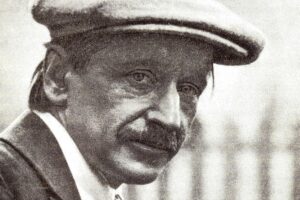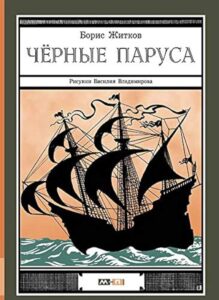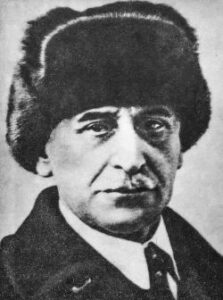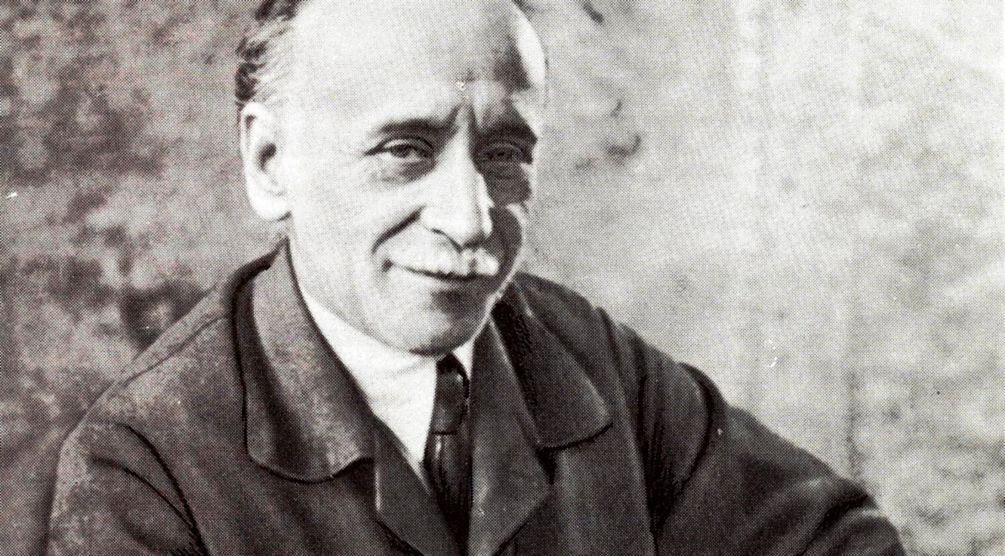Boris Zhitkov.
Biography:

When it comes to writers with character – those who have seen the world and experienced a lot first-hand, they usually remember foreign writers like Ernest Hemingway, Jack London, Rudyard Kipling and Henry Rider Haggard. But at the same time, one cannot fail to mention the Russian writer, teacher and explorer-traveler Boris Stepanovich Zhitkov, who wrote mainly in the adventure genre. His fellow writer Vitaly Valentinovich Bianki called him the Eternal Columbus.
Childhood and youth:

Boris’s biography began on August 30 (September 11), 1882. This happened in the city of Novgorod (now Veliky Novgorod). The boy became the second child in the family – the first was a daughter, Vera. Zhitkov’s father Stepan Vasilyevich was a teacher at the Novgorod Teachers’ Institute, his mother Tatyana Pavlovna was a popular pianist, a student of the Russian composer Anton Grigoryevich Rubinstein.
Because of his Jewish roots, the head of the family was closely watched by people from government agencies. When a conflict arose between the teacher and a local politician after the birth of a child, Stepan Vasilyevich decided to take the family to another place. Subsequently, the man brought the family to Odessa, where his brother and sister lived at that time.
In Odessa, the man got a job as a cashier-accountant on a steamship, and Tatyana Pavlovna became a private tutor for playing the keyboard. Vera and Boris received their primary education at home, and then entered the local gymnasium. At the educational institution, Zhitkov met the future writer and translator Korney Chukovsky, as well as Vladimir Evgenievich Zhabotinsky, the future founder of the Jewish Legion.
“I met Boris Zhitkov in childhood, that is, back in the 19th century. We were the same age, studied in the same class at the same Odessa Second Progymnasium, but he did not pay any attention to me for a long time, and this hurt me,” Chukovsky recalled.

In 1901, the young man entered the Imperial Novorossiysk University, Department of Natural Sciences. As a student, he first became interested in playing the violin, and later became interested in photography (unfortunately, not a single photo of the writer of those years has survived). The guy did not forget about physical development either – already in his 3rd year, the young man won prizes in sailing competitions.
A hyperactive character and certain convictions led Zhitkov to help smuggle weapons for sailors who decided to rebel during the Russian Revolution of 1905. The student was expelled from the university due to his political activities. Having been reinstated, he did not receive a diploma – in 1906 he was given a certificate of completion of the university course. Due to the unstable situation in the country, the native of Novgorod could not find a job for a long time. As a result, on the advice of a friend, he decided to become a sailor. After several trips to sea, he passed the exams for a navigator. As a navigator of a sailing vessel, the native of an intelligent family made trips to Turkey and Bulgaria.
Education and Travel:

Boris Zhitkov came to literature late. On the other hand, it was his stormy and eventful life that became the basis for many of the author’s works. In addition, Zhitkov kept a diary and regularly wrote letters to his family, thus getting his hand in the writing craft. In 1909, the traveler became the captain of a research vessel that took part in an ichthyological expedition along the Yenisei.
Upon returning from the expedition, the future master of the pen applied to the shipbuilding department of the Peter the Great St. Petersburg Polytechnic University. In 1910, the navigator went to Denmark to undergo an internship as a metal worker. In 1912, Zhitkov set off on his first round-the-world trip. During the trip, Boris was most impressed by India, Japan, and China. In 1916, the man graduated from a higher educational institution and received the specialty of a shipbuilding engineer.
By the time he graduated from the Polytechnic University, the sailor had already served in naval aviation for a year. In 1916, the traveler received the rank of ensign in the aviation unit, and a year later – second lieutenant in the admiralty. Then Boris Zhitkov left the service and went to work in his specialty at the Odessa seaport.
In 1923, he moved to Petrograd. For more than 10 years, his home was a small apartment on the Petrograd side. Samuil Marshak, Nikolai Oleynikov, Daniil Harms, Yevgeny Schwartz and others became frequent guests of the writer. According to the latter, the children’s writer loved guests:
“With his characteristic desperate impatience, he almost always met us on the street, came out to meet us.”
The move was due to 2 reasons: firstly, he was tired of sitting in one place – his nomadic nature made itself felt. Secondly, the engineer decided to take his manuscript “The Evil Sea” to the publisher. The editors appreciated the work and published it in 1923. From 1925, Zhitkov got a job as a teacher at a local school, and spent all his free time writing.
Books by Boris Zhitkov:

Boris Stepanovich became famous primarily as a children’s writer. It was for young readers that Zhitkov wrote most of his works, in particular, the collections “What Happened”, “Stories about Animals” and others.
The last of the listed works, published in 1935, contained such stories and fairy tales as “The Stray Cat”, “The Brave Duckling”, “About the Monkey”, “About the Elephant”, “About the Snake and the Mongoose” and more.
The storyteller was constantly published in children’s publications: the newspaper “Leninskie Iskry”, the magazines “Novy Robinson”, “Yozh”, “Chizh”, “Yuny Naturalist” and others.
However, the work that Zhitkov considered to be the pinnacle of his creativity was the novel “Viktor Vavich”, dedicated to the events of 1905. For a long time, the work of Boris Stepanovich was not published, since it was banned. The uncut version was published only in 1999 thanks to Korney Chukovsky’s daughter Lidia, who discovered the manuscript in her father’s archives.
It is worth noting that many admired this book. Among those who liked the work of Boris Zhitkov were the writer Boris Pasternak and TV presenter Avdotya Smirnova. Critics noted that if not for the censorship, “Viktor Vavich” could have taken a place in Russian classics between “Quiet Flows the Don” and “Doctor Zhivago”.
Personal life:

Little is known about the storyteller’s personal life. The nomadic lifestyle did not allow the traveler to start a normal family. Felicita Fedorovna Guseva became the navigator’s first wife. He raised two children with her – a son Nikolai and a daughter Felicita. In 1912, the marriage actually fell apart.
In the same year, Zhitkov married Elizaveta Petrovna Bakhareva. Boris Stepanovich was in a union with her until 1923. The author’s third chosen one, Sofya Pavlovna Yerusalmi, was an ophthalmologist by profession. According to Chukovsky, the lady was the niece of Mikhail Kobetsky, with whom the narrator studied at the same gymnasium.
Towards the end of his days, he lived in a marriage with Vera Mikhailovna Arnold, the daughter of the director of the Belogorodsk school and a Soviet cryptographer. The couple had no children.
The death of Boris Zhitkov:

Back in 1937, Boris Stepanovich felt unwell. On the advice of an acquaintance, he decided to try therapeutic fasting, but this only worsened his situation. The book that Zhitkov planned as “Encyclopedia for four-year-old citizens “Pochemuchka”” was finished by the writer, already dictating to his wife. The work was later published under the title “What I saw”.
The storyteller did not manage to finish his other work – “Help is coming”, dedicated to technology serving for the benefit of humanity. Nevertheless, it was also later published under the title “Stories about technology”. The writer died on October 19, 1938. The cause of death of the master of the pen was lung cancer. He was buried in Moscow, in the 6th section of the Vagankovskoye cemetery.
Memory:

Animated films were made based on the works of Boris Zhitkov. Among them, it is worth noting the animated film “Buttons and little men” based on the manuscript “How I caught little men”. In 1981, at the television film festival in Yerevan, the creators took the jury prize and the award for direction.
The films “Sea Stories”, “Angel’s Day” and “Storm na Sudse” were also created based on the works of the master of the pen. The latter was directed by cinematographer Eduard Nikandrovich Bocharov, Honored Artist of the RSFSR.
In 1984, Boris Stepanovich became the prototype of the main character of the drama “Look Back for a Moment”, staged at the Odessa Film Studio by director Vyacheslav Kolegaev. Zhitkov in adulthood was portrayed by actor Viktor Proskurin, and his friend Korney Chukovsky was portrayed by actor Oleg Efremov (the full namesake of the more popular performer).
In addition, in Russia and Ukraine, streets in such cities as Tyumen, Volgograd (Zhilgorodok microdistrict), Moscow, Odessa and Kyiv are named after the narrator.
Bibliography:
- 1924 — “The Evil Sea”
- 1925 — “Sea Stories”
- 1931 — “The Stone Seal”
- 1935 — “Stories about Animals”
- 1939 — “What I Saw”
- 1940 — “Stories”
- 1941 — “Viktor Vavich”
- 1942 — “Stories about Technology”
- 1956 — “The Red Commander”
- 1989 — “Stories about Animals”
Interesting facts:
- Zhitkov spoke 11 foreign languages to varying degrees.
- In his 1931 science fiction essay “Microhands,” the author described microscopic devices similar to nanotechnology, which actually began to develop in the 21st century.
